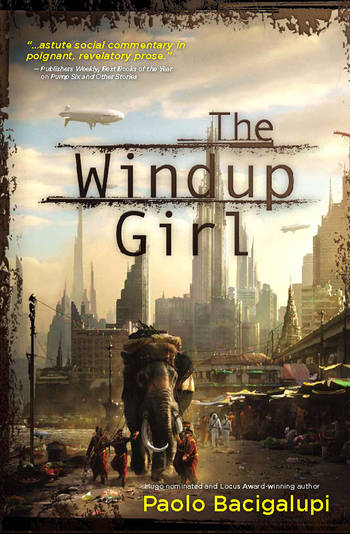My Best (And Favorite) Books of the Decade
/
I told myself that I wouldn't jump in on this best of the decade that everyone else has been doing on just about every online printed source, but after seeing a couple of very good and a couple more very confusing ones, I went through my bookshelves and pulled out several books that were my favorite, and in my opinion, best genre books of the past ten years.
The Windup Girl, Paolo Bacigalupi This book was released earlier this year, and while I was unfamiliar with Mr. Bacgalupi's shorter fiction, I was singularly impressed with his first novel, The Windup Girl. I've already reviewed the book in length here, but in retrospect, this will likely stand up as one of the best genre books in the past ten years. The Windup Girl is not only well written, it's well conceived, which is just as important, I think, for a future world. Bacigalupi puts together a compelling, terrifying and ultimately believable near future, with relevance and everything that good science fiction should be.
Jonathan Strange & Mr. Norrell, Suzanna Clarke Jonathan Strange & Mr. Norrell was one of the books that took me a long time to get into and to finish - I stopped and started it several times since I got it, but was never able to really get into it before I actually made the time to read. It's a challenging book, with an older style of writing. Once I had gotten into the proper mindset, I was pulled right into Suzanne Clarke's alternative world of Wizards, Napoleonic War and fate, and loved every minute from that point on. Clarke dispels with the very common notion of sword and sorcery fantasy novel by setting it in a far more relatable London, and approaches the subject matter in a far different manner than other books of the genre.
American Gods, Neil Gaiman American Gods is another novel that I had to take my time to read, stopping and starting a couple times before really getting into the proper mindset that was required for Gaiman's world. This sort of mythological story is an interesting concept, where belief begets creation, and there is a conflict brewing between the old and the new, with the protagonist, Shadow, caught in the middle. The story is a profound one, and one that I'll likely return to someday.
Soon, I Will Be Invincible, Austin Grossman Where a couple of the novels on this list have been akin to great feasts of old, Soon, I Will Be Invincible is a modern day family dinner, a bit rushed, fairly complete but really good. Author Austin Grossman creates an entire superhero mythology, split between a hero and villain, in a modern day setting. Where a number of comic books have stagnated, with the same characters recycled year after year, we are party to a mythology that is put together with the benefits of a realistic society. Grossman's superheroes are just as messed up as the rest of us, and this is where the book is an incredible amount of fun, because it's like the Marvel Universe, but all grown up.
The Magicians, Lev Grossman Lev Grossman is the brother of Austin Grossman, and like his twin brother, he takes what was a well tread-upon world and tweaks it to become more relatable in The Magicians. Here, rather than superheroes, we are treated to wizards, and a magical academy. The style here is very different, and while there are similarities to Harry Potter and the Chronicles of Narnia, they act more as references and influences than they do style and feel. Grossman's Brakebills College is realistic where Rowling's Hogwarts is not, and imagines the fantasy world as one akin to ours.
The Lies of Locke Lamora, Scott Lynch I learned of Scott Lynch through a friend of mine, and when I picked up his debut fantasy novel The Lies of Locke Lamora, I was already pretty excited, and was impressed with Lynch's style of storytelling - his fantasy world is different from the typical sword and sorcery take that a lot of fantasy novels seem to have taken on. Like other authors on this list, he has put together an incredibly well conceived world, one that was vibrant, dangerous and interesting all at the same time. Lynch's follow-up novel, Red Seas Under Red Skies was just as good, and I'm eagerly awaiting the third installment of his series, The Republic of Thieves.
Altered Carbon, Richard K. Morgan Altered Carbon debuted with quite a bit of buzz, when it was released. Richard K. Morgan's first book about a noir mystery in a conscious/body swapping sounds like something out of the worst dregs of B-movie Science Fiction, but the result is a dark, exciting and intelligent SciFi thriller that I think of as Blade Runner, but more violent. The first of the Takeshi Kovacs trilogy, Morgan weaves together a complicated and twisting futuristic tale, one that had me guessing throughout the book.
The Amber Spyglass, Philip Pullman Where Harry Potter was the real fantasy show stopper of the decade (and for good reason), I've always thought that Philip Pullman's Golden Compass trilogy (The Golden Compass, The Subtle Knife and the Amber Spyglass) was a bit marginalized. Pullman's fantasy tale is more than that - it pulls in elements of science fiction and alternate worlds to put together an epic story that goes from a childhood fantasy adventure to discovering the nature of existence itself, while a war between two sides of that sort of question rages on across multiple universes. The Amber Spyglass, the conclusion to the series, is heavy with meaning, questions and utter brilliance, and is far above and beyond most genre books to begin with.
Coyote, Allen M Steele Allen M. Steele's Coyote was first serialized in Asimov's Science Fiction magazine, and is still a joy to read after several sit-down sessions. Grounded in quite a lot of hard science fiction, Coyote tells the story of a near future colony of humans who steal a massive space ship from their fascist American government and find themselves on Coyote, the moon of a distant planet that was deemed a good candidate for colonization. The story follows several characters as they learn to exist on this hostile new world, in a story that is very reminiscent of the origins of America. The follow-up books in the series are good, but this is easily the best. While the story isn't groundbreaking, it is a great deal of fun, covering a number of popular themes, chief of which is exploration and discovery, which helps to remind me why I love this genre so much.
Halting State, Charles Stross Charles Stross is one of the preeminent science fiction writers of our time, and his novel Halting State demonstrates that he's really clued in to what might happen in the next couple of years. Halting State is a book that I've talked about before, but what makes this stand out for me for the past decade is Stross's understanding of how the future might work, from technology to politics to economics, all of which are brought in for this story, expertly woven into the actions of the protagonist, and really make this a stellar read.
City of Pearl, Karen Traviss Karen Traviss has been making a name for herself with the tie-in world with Star Wars, Gears of War and Halo, but this first book in her own universe outshines them all. City of Pearl is a wonderfully realized book, the first in a six book series that puts together first contact, interstellar politics and warfare, environmentalism and bioethics. Spanning the course of several hundred years and across a couple of planets, this book puts all of that in with a number of intriguing characters and well conceived plot lines. The bonus is Traviss's cynical attitude towards humanity, which makes this book a bit of a break from most of the human-centric stories that I've read.
Think about this, I think that this is a good list to have put together. In a very big way, the past decade has been the most formative when it comes to my tastes in books, music and movies, and where my interests in Science Fiction, Fantasy and related genres really came from. This decade marked my high school years, where I not only transitioned from a Star Wars only diet of reading material to the larger classics: Dune, Ringworld and Foundation, to name a few.
While I got most of my base from these classics, most of the books that I've picked for this list are far from the classics - at points, they take a lot of the best themes and turns them on their heads, realizes a number of well conceived notions in new light and makes the genre something new and interesting to read. While reading these books, I've come to realize that the field of science fiction is not one to be left mired in the b-movie territory that long characterizes it; it is a dynamic and interesting field, one that will continue to thrill fans in the future.





